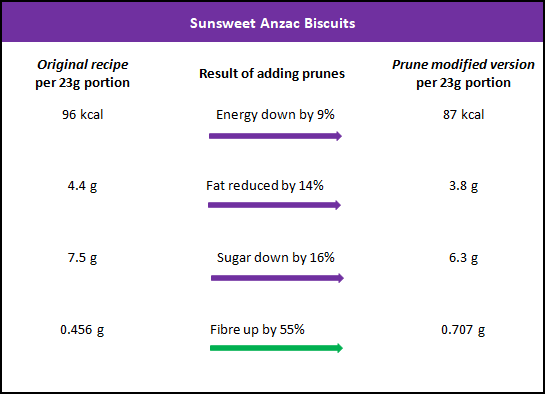Benefits of using prunes in cooking
Prunes offer unique baking benefits, both nutritionally and physically so not only do they help create delicious tasting dishes, they can also improve the overall nutritional credentials for a recipe! Here’s how:

- Replaces free sugars with naturally occurring sugars
- Reduces sugar
- Reduces fat
- Less sugar than dates
- Added fibre
- Lowers total calories
- Other uses of prunes in cooking and healthy eating
- It’s not always possible to make cakes from scratch, so to help keep portion sizes of ready-made cakes down, serve with a handful of prunes, or drizzle with prune puree if appropriate!
- Adding whole or chopped prunes within recipes, or on the side counts towards your 5 a day intake.
- Not only are prunes good in sweet baked dishes, their subtle sweetness and unique combination of substances including sorbitol and malic acid, all combine to mean prunes work like a natural preservative, helping to retain moisture and extend shelf life. SO, your batch cooking will stay fresher and moist for longer!
- Prunes can be enjoyed as part of a varied and balanced diet and a healthy lifestyle. Eating 100g (8-12) prunes a day can contribute to normal bowel function; their vitamin K and manganese content means that they can help maintain normal bones; and being a source of copper and manganese, this can help protect cells from oxidative stress. Why not learn more about the nutritional benefits of prunes, and see how it can contribute to your healthy and balanced lifestyle?
We all know we shouldn’t eat too much sugar, and experts globally recommend we reduce intakes of ‘free sugar’, but with different sugars everywhere, which kind should we reduce and what can we replace it with? Free sugars are sugars added to food and drinks, and sugars naturally present in honey, syrups and fruit juices.
Prunes are a traditional dried fruit with no added or free sugars - their sweet taste originates from their naturally occurring sugars, contained within the fruit, which is 38g/100g.
These Sunsweet Oatmeal and Blueberry Muffins have had 100g of the 175g of free sugar in the original recipe replaced with the same quantity of chopped prunes, giving a 57% reduction in free sugars. And they still taste fantastic. So it’s a win-win, using prunes reduces the total sugar without compromising on the flavour!
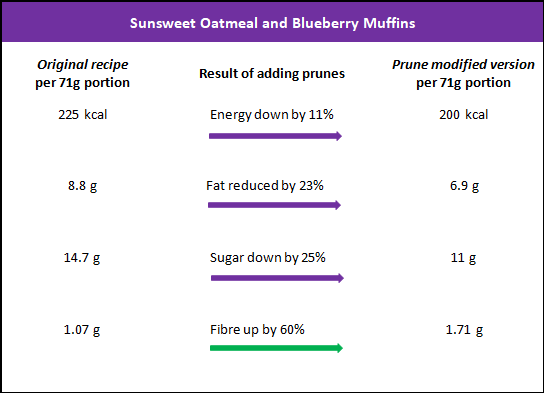
An added bonus of adding whole or chopped prunes to cakes is that they contribute to our daily fruit and vegetable intake – in fact this recipe provides half a daily portion per muffin.
Sugar is a key ingredient in desserts - creating texture, taste and flavour, but often there’s far more than is needed. Prune puree is a handy way to reduce the total sugar content of recipes. For example, all the added sugar (and half the cream!) were replaced with prunes in these delicious Sunsweet Mocha Mousse Chocolate and Prune Pots, per portion, sugar reduced by 4.6g; fat by 5.1g; and energy by 50kcal.
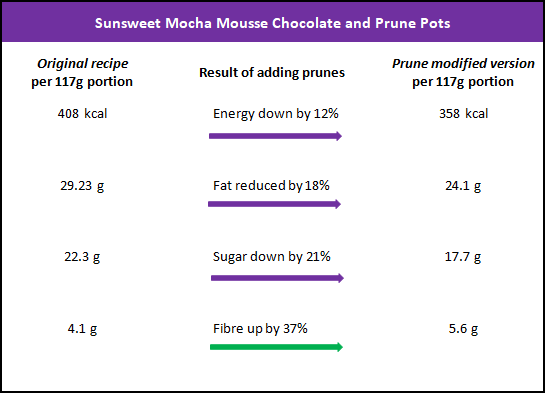
As a general rule using prune puree to replace sugar can reduce total sugar content in pudding recipes by a quarter. Give it a try!
Prunes are naturally fat free yet their fibre and sorbitol content mean they behave like fat in baking. Additionally, prune puree has a silky consistency that is very similar to butter. The fibre and sorbitol work to retain moisture and, together with prunes’ malic acid, enhance flavours by bringing out the flavours of other ingredients without overpowering them. These unique qualities help produce soft and chewy baked goods. They are perfect attributes for modifying this traditional Prune and Almond Cake recipe. Inclusion of prunes meant butter and sugar could easily be reduced and additionally the original mascarpone cheese was replaced with a much lighter yoghurt, to create a cake that is lower in fat, saturated fat and sugar.
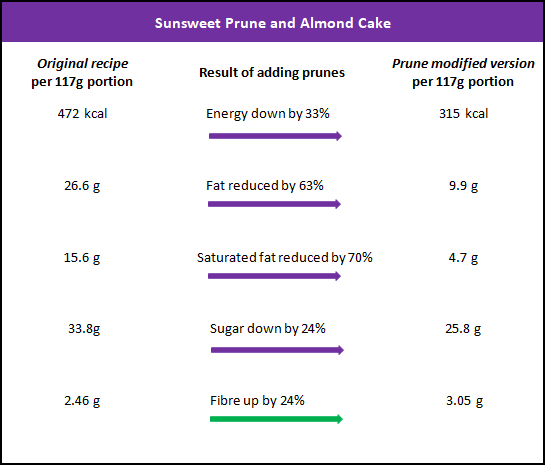
The fantastic deep purple colour of prunes helps create a baked and roasted appearance, perfect for baking and an added bonus for pale-looking gluten free breads. These same qualities also work brilliantly in savoury meat dishes.
Dates are commonly used as an added sugar replacer in sticky toffee pudding, but did you know prunes contain 30g less sugars per 100g. Prunes taste less sweet due to their sorbitol content, which is the highest of any dried fruit! Sorbitol is type of carbohydrate called a polyol, which tastes less sweet than other sugars, such as sucrose.
It is the sorbitol and fibre in prunes that are responsible for prunes being beneficial for maintaining normal bowel function. Prunes’ unique blend of sorbitol and fibre mean it’s possible to add extra fruit to a recipe - a real feel good factor! [sugars: prunes 38g/100g; and dates 66-70g/100g. Dates and prunes both contain no added sugars.]
This scrumptious Sticky Toffee Pudding replaces dates with prunes, reducing added fat and sugar, increasing the fibre content and adding 75g of extra fruit! The final recipe (per 100g) contains 28% less sugar, 43% less fat and 89% more fibre than the original.
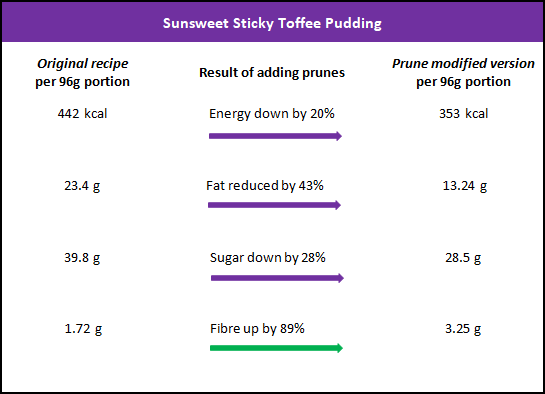
Fibre has been the forgotten essential of our diet, which is probably why we consume under 20g per day, way less than recommended. The UK daily recommendation for fibre is 30g and a recent review commissioned by the World Health Organisation showed that low fibre consumers were at much higher risk of heart disease, cancer and type 2 diabetes.
Prunes are high in fibre (7.1g/100g), so adding prunes to these recipes increases the overall fibre content between 35-89%. Adding prunes to a Flourless Chocolate Torte increased fibre content by 57% per portion!
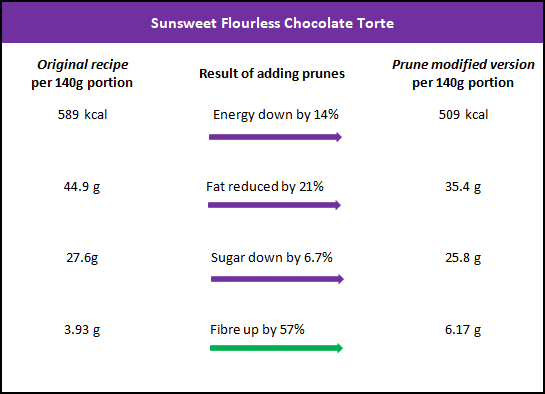
And did you know…prunes are also a dream match with chocolate due to their caramelized flavours and vanilla undertones.
We all know butter means high calories- yes a whopping 744kcal per 100g, whereas prunes contain just 229kcal/100g, so since prunes behave like fat (but are fat free!), replacing butter for prunes can help reduce total energy too! These Sunsweet Anzac Biscuits use chopped prunes, which also act as a binding aide so added butter, sugar and syrup can be reduced to save 9% calories per portion.
